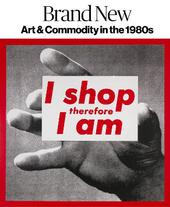
|
Brand New: Art and Commodity in the 1980s
Hardback
Main Details
| Title |
Brand New: Art and Commodity in the 1980s
|
| Authors and Contributors |
By (author) Melissa Chiu
|
|
By (author) Gianni Jetzer
|
| Physical Properties |
| Format:Hardback | | Pages:192 | | Dimensions(mm): Height 273,Width 222 |
|
| Category/Genre | Art and design styles - from c 1960 to now
Exhibition catalogues and specific collections |
|---|
| ISBN/Barcode |
9780847862412
|
| Classifications | Dewey:700.4113 |
|---|
| Audience | |
|---|
| Illustrations |
160 Colour Illustrations
|
|
Publishing Details |
| Publisher |
Rizzoli International Publications
|
| Imprint |
Skira Rizzoli
|
| Publication Date |
13 February 2018 |
| Publication Country |
United States
|
Description
This groundbreaking catalog, accompanying a major exhibition at the Hirshhorn, examines the rise of Neo-Conceptualism and the corresponding clash of art and commerce that characterised New York art in the 1980s. Presenting the works of artists such as Jeff Koons and Richard Prince alongside contemporaries Vito Acconci, Ashley Bickerton, Barbara Bloom, Jessica Diamond, General Idea, Felix Gonzalez-Torres, Peter Halley, Jeff Koons, Peter Nagy, Joel Otterson, Richard Prince, Pruitt-Early, Cindy Sherman, Meyer Vaisman and Julia Wachtel, Brand New provides insight into this pivotal decade and the corresponding rise of some of the biggest names today. Fueled by a series of political, cultural and technological shifts, the 1980s brought about a golden era of contemporary art, with the nation's newfound economic prosperity setting the stage for the re-evaluation of the art object. Newly commissioned essays capture the connecting threads: Within the environment of the 1980s, material goods were seen as a demonstration of power and financial wealth, while the artist was associated with cultural capital. For the first time, art and commodity conflated, with everyday objects such as vacuum cleaners, clocks, tires and drums becoming contingent channels for storytelling rather than stand-alone works. At the same time, the artists themselves became brands, in many cases resulting in the interdependence between public persona and artistic output. Coinciding with the height of the information age and the rise of modern branding, what began as satire came to define the world today. The market variations of the 1980s triggered an important change, as artists simultaneously subverted and embraced this increased commodification by essentially branding both their art and personas.
Author Biography
Melissa Chiu is director of the Hirshhorn Museum and Sculpture Garden, Washington D.C. Gianni Jetzer is an independent curator and critic based in New York as well as Curator-at-large at the Hirshhorn Museum and Sculpture Garden in Washington DC. He has realised numerous exhibitions with artists in his positions as curator at Migros Museum in Zurich (1998-2001), Director of Kunsthalle St. Gallen (2001-2006), and Director of Swiss Institute in New York (2006-2013). Leah Pires is a writer and curator living in New York, where she is a doctoral candidate in the Department of Art History at Columbia University. Bob Nickas has worked as a critic and curator in New York since 1984, during which time he has organised more than 80 exhibitions and gained a reputation for an individual style that transgresses the accepted.
|